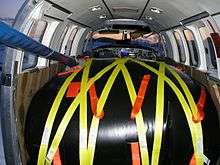Ferry tank
A ferry tank is an auxiliary fuel container that is usually temporarily attached to a motorized device which it feeds fuel to. A ferry tank allows the range or endurance of the vehicle or aircraft to be extended. Ferry tanks are typically used in both civil and military aviation; civil aviation and transport aircraft tend to use internal tanks while combat aircraft will use external tanks.

In aviation, ferry tanks allow aircraft additional range to reach destinations beyond the aircraft's specified range when there are no available re-fueling stopover locations. For example, for an aircraft with only 1,000 miles range to be delivered from North America to Hawaii, which is over 2,000 miles away, that aircraft will require a ferry tank to supply it with enough fuel to travel the excess miles.
History
The first Ferry Tanks were drop tanks that fit externally on the aircraft and were used primarily by the military, allowing combat aircraft to both travel longer distances and remain in combat longer, giving advantages to air forces that utilized them on their planes. But they also made the planes vulnerable to small arms fire.[1] Ferry tanks for civilian uses were developed and companies like Aluminum Tank Industries and Sky aviation began offering tanks that were aluminum based and had to be fit and installed into the aircraft.[2]
Design
Aluminum ferry tanks not only took up valuable cargo space and damaged the aircraft but made the aircraft susceptible to fire due to fume build-up within the tank.[3]
Collapsible Ferry Tank
.jpg)
In 1991 Turtle-Pac came up with a solution to this problem with the development of a collapsible Ferry Tank. Unlike aluminum tanks, the collapsible tank is made of a soft structure that can alter shape under high “G” loads, which increases its puncture and burn resistance. Furthermore, the tanks self-wedge into the fuselage and is gripped by friction. This reduces the load on the tie point considerably.[4]
External tanks
Military forces often utilize external ferry tanks, allowing aircraft to travel greater distance or remain in combat longer. For example, external ferry tanks made possible the Israeli Air Force raid on the Osirak nuclear reactor known as Operation Opera.[5] The external tanks refill the main tank as it is depleted. Empty external tanks may be dumped in flight, known as drop tanks, or may be retained.
Internal tanks
Most civilian aircraft utilize internal tanks. Depending on the design or specification of the tanks they might replace room intended for passenger seating or cargo and the fuel might either drain or be attached to the main tank by a transfer pump.[4]
See also
References
- Dunham, George. U.S. Marines In Vietnam: The Bitter End, 1973-1975.
- "Ferry Tank Installation". Skyview Aviation, LLC. Retrieved 2017-01-24.
- "Fuel Tank Regulations - Transfer Flow, Inc. - Aftermarket Fuel Tank Systems". www.transferflow.com. Retrieved 2017-01-24.
- "Collapsible Aircraft Ferry Tanks |". www.turtlepac.com. Retrieved 2017-01-24.
- "Operation Opera: how 8 Israeli F-16s destroyed an Iraqi nuclear plant 33 years ago today". The Aviationist. 2014-06-07. Retrieved 2017-01-13.